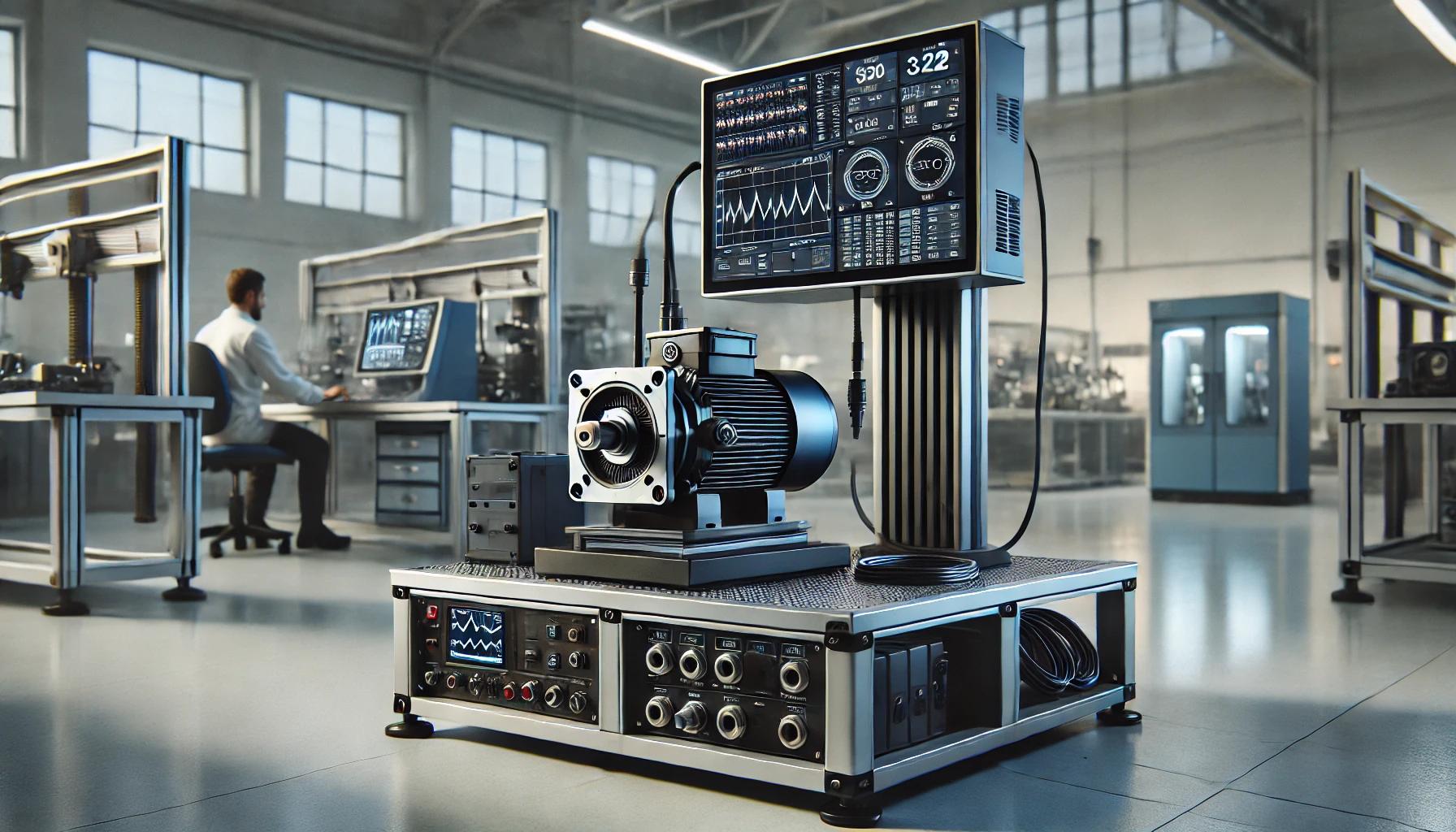The servo test bench is an indispensable tool in the field of industrial automation. It ensures the precision, reliability, and efficiency of servo motors used across various industries. By simulating real-world operating conditions,it helps detect performance issues, improve quality, and reduce downtime. Whether you are working with manufacturing robots, CNC machines, or automated assembly lines, understanding the functionality and importance of this equipment is vital.
What is a Servo Test Bench?
A servo test bench is specialized testing equipment designed to evaluate the performance, functionality, and durability of servo motors and servo drives. Servo motors, known for their precise control of position, speed, and acceleration, require stringent testing to meet industry standards.
It replicates the operating environment of a servo motor, allowing engineers to measure parameters like torque, speed, efficiency, and temperature. It also detects potential faults, ensuring that the motor is ready for demanding industrial applications.
Why is a Servo Test Bench Essential?
Servo motors play a pivotal role in automation systems. Their performance directly impacts productivity, precision, and efficiency. It is essential for the following reasons:
- Quality Assurance: It ensures that the servo motor meets quality and performance standards.
- Fault Detection: Early identification of issues prevents costly breakdowns.
- Improved Efficiency: Optimizing servo performance leads to energy savings.
- Product Longevity: Proper testing enhances the durability of motors.
- Customization Testing: It supports specific configurations for diverse applications.
Key Components of a Servo Test Bench
To function effectively, a servo test bench consists of several critical components:
- Load System: Simulates the mechanical load on the servo motor during operation.
- Sensors: Measure parameters like torque, speed, and temperature.
- Control System: Monitors and adjusts motor performance during tests.
- Data Acquisition System (DAQ): Records and analyzes real-time data.
- Software Interface: Displays results and generates performance reports.
- Power Supply Unit: Delivers regulated power to the servo motor.
Each component works harmoniously to provide accurate testing results.
Types
Several types of servo test benches cater to different testing requirements. Some common types include:
- Dynamic Load Test Benches: Designed to evaluate the performance under variable load conditions.
- Endurance Test Benches: Focused on testing motor durability over extended periods.
- Thermal Testing Benches: Measure motor behavior under varying temperature conditions.
- Custom Test Benches: Tailored to meet specific industry or application needs.
How Does a Servo Test Bench Work?
The working process of a servo test bench can be divided into key steps:
- Motor Setup: The servo motor is mounted on the bench and connected to the load system.
- Input Configuration: Parameters like voltage, load, and speed are set through the control interface.
- Testing Procedure: The motor operates under simulated conditions while the sensors collect data.
- Data Analysis: The DAQ system processes the data and generates performance metrics.
- Report Generation: Test results are compiled into detailed reports for engineers.
This systematic process ensures accurate and reliable testing.
Applications of a Servo Test Bench
Servo test benches are widely used in industries where servo motors are integral. Common applications include:
- Robotics: Ensures smooth and precise robot movements.
- CNC Machinery: Verifies motor reliability for milling, turning, and drilling operations.
- Automotive Industry: Tests motors used in automated production lines.
- Packaging Industry: Evaluates servo performance for high-speed packaging machines.
- Aerospace: Ensures the reliability of motors used in flight control systems.
Benefits of Using a Servo Test Bench
Using a servo test bench provides numerous benefits, including:
- Enhanced accuracy in motor performance assessment.
- Early detection of faults, reducing downtime.
- Increased operational efficiency and energy savings.
- Extended motor lifespan through preventive testing.
- Adaptability to various industrial requirements.
Setting Up a Servo Test Bench
Setting up a servo test bench requires careful planning and attention to detail. Follow these steps:
- Select the Right Test Bench: Choose a bench that suits your motor specifications and testing needs.
- Prepare the Workspace: Ensure adequate space, ventilation, and safety measures.
- Install the Bench: Assemble and secure all components.
- Calibrate the Sensors: Ensure accurate measurement of parameters.
- Connect the Motor: Properly align and secure the motor to the bench.
- Perform Test Runs: Verify the system’s functionality before conducting full tests.
Proper setup is crucial for obtaining reliable test results.
Best Practices for Using a Servo Test Bench
To maximize the benefits, adhere to these best practices:
- Regularly calibrate sensors for accurate measurements.
- Use appropriate safety gear to prevent accidents.
- Follow the manufacturer’s instructions for setup and operation.
- Conduct periodic maintenance of the test bench components.
- Train personnel on the correct usage of the equipment.
By following these guidelines, you can ensure safe and effective testing.
Challenges in Servo Motor Testing
While it simplifies the testing process, challenges may arise, such as:
- Difficulty in simulating extreme environmental conditions.
- Sensor inaccuracies affecting test results.
- High initial investment for advanced test benches.
- Maintenance complexities in high-tech systems.
These challenges can be mitigated through proper planning, regular maintenance, and investing in high-quality equipment.
Servo Test Bench vs. Traditional Testing Methods
Comparing a servo test bench with traditional testing methods highlights its advantages:
| Parameter | Servo Test Bench | Traditional Testing |
|---|---|---|
| Accuracy | High | Moderate |
| Efficiency | Optimized | Time-consuming |
| Fault Detection | Advanced | Limited |
| Cost | Higher Initial Investment | Lower Initial Investment |
| Scalability | Suitable for multiple applications | Limited to specific tests |
It proves superior in most scenarios, offering long-term benefits.
Maintenance Tips for a Servo Test Bench
Proper maintenance extends the lifespan and ensures consistent performance:
- Clean components regularly to prevent dust accumulation.
- Inspect connections and wiring for wear and tear.
- Update software interfaces to the latest versions.
- Replace worn-out sensors and load systems promptly.
- Store the equipment in a clean and dry environment when not in use.
Routine maintenance minimizes downtime and enhances reliability.
Future Trends in Servo Test Benches
The field of servo motor testing continues to evolve. Emerging trends include:
- Integration of AI: Advanced algorithms optimize testing processes.
- IoT Connectivity: Real-time monitoring and data sharing across devices.
- Compact Designs: Smaller, portable benches for on-site testing.
- Sustainability: Energy-efficient systems reduce environmental impact.
- Enhanced Software: User-friendly interfaces with detailed analytics.
These trends promise to make servo test benches even more effective and versatile.
Conclusion
A servo test bench is a vital tool for ensuring the performance, durability, and precision of servo motors. By providing a controlled testing environment, it helps industries maintain high standards of automation and efficiency. As technology advances, servo test benches are becoming more sophisticated, paving the way for innovative applications and enhanced productivity.
FAQs
What is a servo test bench?
It is specialized equipment used to evaluate the performance and reliability of servo motors under simulated conditions.
Why is it important?
It ensures quality, detects faults, and improves efficiency, making it crucial for automation industries.
What parameters can be measured using it
Key parameters include torque, speed, temperature, efficiency, and power consumption.
Can servo test benches be customized?
Yes, they can be tailored to meet specific testing requirements and industry needs.
What industries use servo test benches?
Industries such as robotics, automotive, aerospace, and packaging rely on servo test benches for motor testing.



